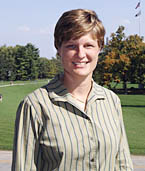Inside Iowa State
Inside ArchivesSubmit newsSend news for Inside to inside@iastate.edu, or call (515) 294-7065. See publication dates, deadlines. About InsideInside Iowa State, a newspaper for faculty and staff, is published by the Office of University Relations. |
October 7, 2005 Striving for equityby Anne Krapfl Seven of Iowa State's 56 department chairs are women. A student -- a single mother receiving Aid for Families with Dependent Children -- left her sick 8-year-old child home alone to take a final exam because she feared her teacher wouldn't believe her situation. Without an exam score, she wouldn't get credit for the class. A female faculty member on a department search committee was told her suggestion (that more than one female applicant be considered) was unacceptable. A 2002 report on the status of ISU women indicated 16 percent of tenure-track women faculty resign by the end of their third year at Iowa State. When this reporter asked why Iowa State still needs a committee on women -- it's 2005, after all -- these are some of the responses I received. And so Iowa State's University Committee on Women (UCW) presses on. Since 1971, in an advisory capacity to the provost's office, committee members have monitored the climate for all women on campus (employees and students) and participated in developing policies and practices that promote equity for women. It includes tasks such as compiling reports from institutional data and conducting interviews for qualitative research, taking part in search processes, assisting with campus networking and mentoring opportunities for women, and collaborating when possible with other campus groups on mutual concerns. "It's not just about the numbers," said Lauri Dusselier, UCW chair for 2005-06. Dusselier is the student health promotion specialist in the Student Health Center. "If we hire women, we have to provide a climate that supports them," she said. Of new tenured and tenure-track faculty hires this year, more than 40 percent are women, according to the provost office. Dusselier mentioned three areas UCW members watch especially closely:
"We closely monitor what the central administration is doing, and bring up topics again, if we have to," she said. To do this yearA UCW subcommittee is wrapping up a status of women report in the College of Engineering, which will be shared with college leaders when it's ready. The subcommittee completed a similar report on the College of Agriculture in 2000. Former dean Catherine Woteki received a copy of it when she arrived in 2002 and did a good job of addressing issues in the report, said UCW member Judy Dolphin, director of the Ames/ISU YWCA. Next up will be similar studies of the colleges of Veterinary Medicine and, later, Business. The reports include data collected routinely by Institutional Research, as well as qualitative data drawn from interviews with women in the college. In other projects this year, UCW subcommittees will:
Get it doneIowa State's UCW has a history of accomplishment, due at least in part to perseverance. Early highlights include a campus newsletter for women, a women's center (1974) and, in 1981, a home for the women's center in Sloss House. The "status of women" report, begun in 1982, has continued regularly and also morphed into the separate college reports. Administrators have used these reports to make policy changes that improve the campus climate for women. Iowa State has a sexual harassment policy intended to protect students and employees. Some, such as former UCW member Liz Beck, say the policy needs to be more visible. "We have not done due diligence on sexual harassment," she said. "When do you hear about it [the policy]? When is the last time you saw a copy of it?" UCW was behind a long-term effort to build a "four-points" childcare system (north, south, east and west) on campus. Two centers, at Vet Med and in University Village, are complete. Committee work on early proposals for a parental leave policy (when children are born or adopted) goes back at least to 1990, and UCW led the charge on the most recent proposal (2002) that was supported widely on this campus but tabled by the board of regents. "We're still treating children as an illness. Is that right?" Dolphin said. Among other accomplishments, the UCW:
"I think that has changed the climate for the search and evaluation process," Dolphin said. "It's really a 'hold the feet to the fire' approach." |

Lauri Dusselier will chair the University Committee on Women this year. Photo by Bob Elbert. University Committee on WomenFormed: 1971 by vice president for academic affairs George Christensen Members: 9 each from faculty, P&S, and Merit staff ranks, 6 students and 3 ex-officio members from the Women's Leadership Consortium (directors of units that coordinate women's programming) 2005-06 chair: Lauri Dusselier, Student Wellness Center |